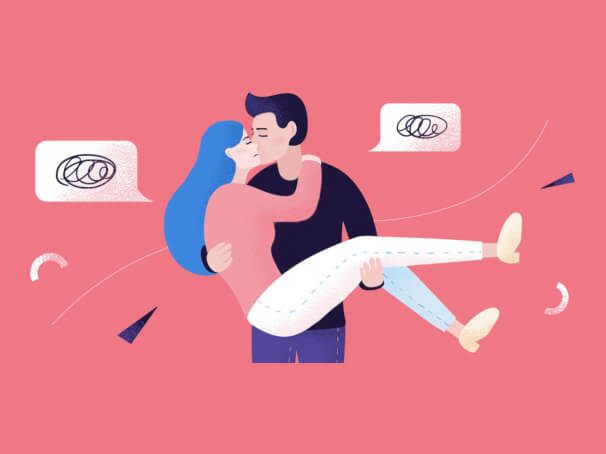
Health anxiety is a common problem when living with anxiety, and unfortunately the fear of developing some type of physical condition and the associated symptoms can lead to more anxiety. It becomes even more of a problem when anxiety actually does create some type of physical issue.
Fibromyalgia is a condition characterized by chronic, widespread pain that tends to cause people to become over sensitive to physical stimuli - even when touched in various parts of their body. There are several connections between anxiety and fibromyalgia, and in some cases it may be classified as its own anxiety symptom.
Connections Between Anxiety and Fibromyalgia
One of the thoughts you need to try to fight when you have anxiety is the belief that your physical symptoms are based on a dangerous underlying health condition, rather than just anxiety. This way of thinking can create more anxiety, which makes it much harder to treat and may cause more physical symptoms.
Fibromyalgia is one of many conditions that may be linked to this type of thinking. People feel pain, and they convince themselves that they don't have anxiety, and instead may be suffering from multiple sclerosis or some other condition that is causing their physical symptoms. The reality is that some of the symptoms that people with fibromyalgia experience may be triggered or worsened by anxiety.
How Anxiety May Contribute to, Cause, or Be Caused By Fibromyalgia
Fibromyalgia is such a controversial condition that has stimulated a huge amount of debate within the medical community. The following points attempt to explain some of the many possible ways in which Fibromyalgia and anxiety may affect one another:
- Anxiety Causing Fibromyalgia It's not clear how or why anxiety would cause these symptoms, but a link does exist. It's possible that anxiety triggers a neurotransmitter response that increases nerve firing or inflammation within certain parts of your body. It's also possible that the stress from anxiety damages something in your body that makes fibromyalgia occur. It's not how exactly anxiety might cause or exacerbate fibromyalgia, but a link does appear to exist and anxiety may play a causal role. More research is required at this point.
- Anxiety Contributing to Fibromyalgia More likely, however, is that you may be prone to some mild form of fibromyalgia and anxiety simply makes it more pronounced. Anxiety can cause what's known as "hypersensitivity," which is when your mind and body are more attuned to physical sensations, thus amplifying the symptoms. This would create not only more pain, but more noticeable pain.
- Fibromyalgia Causing or Contributing to Anxiety Pain and fear over the cause of that pain is also something that can lead to severe anxiety, and indeed many people with fibromyalgia appear to develop anxiety as a result. Pain, fatigue, tingling, and other fibromyalgia symptoms are also often triggers of panic attacks. It should be noted that the result of this anxiety may be cyclical, where each symptom causes the other to worsen.
- No Fibromyalgia One issue that also needs to be considered is that you do not have fibromyalgia at all. It's important to talk to a doctor, but you should know that both generalized anxiety disorder and panic disorder often have similar symptoms to fibromyalgia. Panic disorder can also lead to pain and tingling in the legs, feet, hands, face, and more, and this pain may occur as a result of hyperventilation and hypersensitivity - with no link to fibromyalgia at all.
If these sound like they don't specifically narrow down the cause of the condition, that's because they don't. In fact, doctors are so unclear as to the cause of fibromyalgia and its link to anxiety and depression that there are currently no definitive answers for the disease independently or how anxiety relates.
But the relationship is there, and so it's absolutely possible that anxiety is causing or contributing to your fibromyalgia symptoms, or vice versa.
How to Stop Fibromyalgia From Anxiety
Treatments for the disorder vary. Many doctors will prescribe medications to manage the pain, but in general these are simply basic pain medications since of course the cause of fibromyalgia is still unknown, and thus hard to specifically treat. The treatments that are relevant to those with anxiety include:
- Exercise Exercise has been studied extensively with regard to fibromyalgia, and these studies seem to confirm that it is an important tool for managing both the pain and fatigue caused by fibromyalgia symptoms. The good news is that exercise is also a cure for anxiety, so integrating exercise into your life is a must.
- Anxiety Reduction Without exercise, anxiety reduction alone has only a moderate effect on your fibromyalgia symptoms. But the effect is still there, so it's definitely something to consider. Combined with exercise, it appears that the effectiveness of an anxiety reduction treatment improves dramatically. The two treatments can be a great way to effectively fight your symptoms.
- Healthy Lifestyle As is the case with many mild to moderate conditions, living a healthier lifestyle appears to help as well. Do your best to avoid drugs and alcohol, try to sleep as best you can (sleep problems are associated with an increase in symptoms), and try to ensure that you're getting a healthy diet with enough magnesium and other vitamins and minerals.
There is no known cure for fibromyalgia, but researchers are doing their best to understand the condition as fully as possible. Until then, talk to your doctor, and make sure you're focusing on ways to reduce your anxiety and get relief from your anxiety symptoms.












